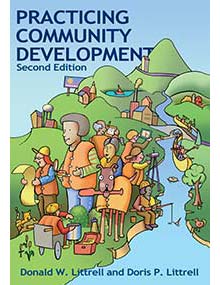Editor's note
The following abstract describes a publication that is only available for purchase.
Community development is a radical profession. It is based on the belief that people can give purposeful direction to their collective future. How this occurs is based on the community, the issues, the current capacity of people and the resource base that is present.
Community development involves work in the ongoing lives of rural, urban and suburban communities. It is an international effort at the community level.
Community development is gaining knowledge and empowerment through a process of collaboration and action. The heart and soul of community development is creating experiences through which people learn they can take ownership of their situation and devise and implement plans of action. The measure of success in a community development effort is the quality of people it produces.
This second edition of Practicing Community Development builds on the first edition written by Donald Littrell and Doris Littrell. The focus is on the ethical and practical aspects of community development. It is full of examples of people coming together and working through challenges. The authors use their experience as a base from which to explore how to help community members implement their visions.
This book is for community members and the people in agencies, government and nonprofit organizations who work with them. It can also be used as a textbook for beginning undergraduate and graduate courses in community development or other social sciences.
Table of contents
Chapter one
Community Development Orientation
- The profession of community development
- Implications for practice
Chapter two
Community Development Assumptions: What We Think About People
- People are capable of rational behavior
- Significant behavior is learned behavior
- Significant behavior is learned through interaction over time
- People are capable of giving purposeful direction to their behavior
- People are capable of creating, shaping or reshaping much of their collective environment to formulate a desired future
- People are in an evolving state of being
Chapter three
Community Development Values: Directions to the Profession
- All people have basic dignity
- People have the right to participate in decisions that impact their current and future well-being
- Participatory democracy is the superior method of conducting the civic business of communities
- Special section
Power - People have the right to strive to create an environment they desire
- People have the right to reject an externally imposed environment
- Maximizing purposeful interaction and dialogue within a community will increase the potential for learning and development
- Special section
A special case: the religious community - Implied within a process of purposeful interaction is an ever widening concept of community
- Every discipline and profession is a potential contributor to a community development process
- Motivation is created through interaction with the environment
- Community development people and organizations have the responsibility to continually learn to enhance the collective capacity of people and communities
Chapter four
The Foundations of Practice
- Democracy
- Freedom
- Citizen Participation
- Self-Help
- Self-Governance
- Special section
Community-based organizations - Special section
Community development in various political settings
Chapter five
Practicing the Principles
- Participation in public decision making should be free and open to all interested people
- Broad representation and an increasing breadth of perspective are conditions that are conducive to community development
- The use of sound, trusted methods is imperative to the study of the community by the community
- Special section
Action research - Understanding and general agreement are the basis for community decision formation, implementation and enforcement
- Any person has the right to be heard in open discussion and dialogue whether they agree with the norms of society
- A holistic, systemic approach is key to working with communities
- All people can participate in creating and recreating their communities
- Special section
Leadership development - Special section
The International Community Development Society's Principles of Good Practice
Chapter six
Administration of Community Development
- Administration of a different sort
- Funding
- Budget management
- Staffing
- The community role of the staff
- Reporting and evaluation
- Rewards
Chapter seven
Resources
- Books
- Courses, manuals and websites
- Organizations
- Classics
About the primary authors
Donald W. Littrell worked in community development as a regional and state extension specialist and professor at MU. Other roles he served during his nearly 40 years of work include Fulbright professor in Thailand and consultant to the U.S. Department of Agriculture. He died in 2005.
Doris P. Littrell is retired from her position as director of MU Direct: Continuing and Distance Education. She also worked with adults returning to school at Stephens College, and she is involved with nonprofit organizations. Her community development work began as a citizen and continued through taking courses and writing about and teaching in the field.
Don and Doris collaborated as consultants, teachers and trainers. Highlights of their work include helping develop and implement the Community Development Academy in Missouri and a Community Development Institute in both Conway, Arkansas, and Thibodeaux, Louisianna. In 2003 they became involved with Together for Hope, a rural poverty initiative that brings people from 20 of the poorest U.S. counties out of poverty through community development.
ISBN
- 0-933842-38-4
- 0933842384
- 978-0-933842-38-0
- 9780933842380
Pages
- 154
 Donald W. Littrell
Donald W. Littrell